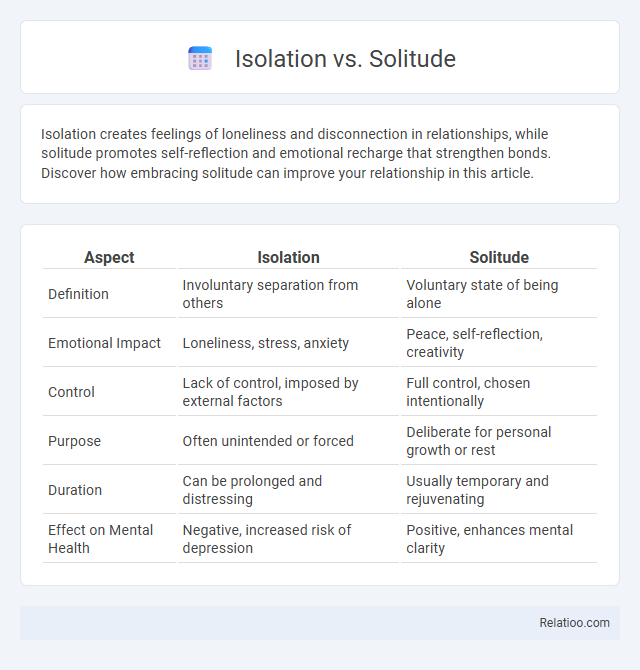Isolation creates feelings of loneliness and disconnection in relationships, while solitude promotes self-reflection and emotional recharge that strengthen bonds. Discover how embracing solitude can improve your relationship in this article.
Table of Comparison
| Aspect | Isolation | Solitude |
|---|---|---|
| Definition | Involuntary separation from others | Voluntary state of being alone |
| Emotional Impact | Loneliness, stress, anxiety | Peace, self-reflection, creativity |
| Control | Lack of control, imposed by external factors | Full control, chosen intentionally |
| Purpose | Often unintended or forced | Deliberate for personal growth or rest |
| Duration | Can be prolonged and distressing | Usually temporary and rejuvenating |
| Effect on Mental Health | Negative, increased risk of depression | Positive, enhances mental clarity |
Understanding Isolation and Solitude: Key Differences
Isolation refers to a state of being physically or socially separated from others, often involuntary and linked with negative psychological effects such as loneliness and stress. Solitude is a chosen state of being alone, providing opportunities for self-reflection, creativity, and mental rejuvenation. Understanding the key differences highlights that isolation is often experienced as alienation, whereas solitude is a deliberate and beneficial form of aloneness.
The Psychological Impact of Isolation
Isolation often leads to negative psychological effects such as increased anxiety, depression, and feelings of loneliness due to lack of social interaction and support. In contrast, solitude can provide beneficial mental health outcomes by allowing for self-reflection, creativity, and emotional regulation when chosen voluntarily. The psychological impact of isolation is primarily harmful because it removes the essential human connection needed for emotional resilience and cognitive well-being.
The Mental Health Benefits of Solitude
Solitude offers significant mental health benefits by allowing You to engage in self-reflection, reduce stress, and enhance creativity without the negative effects often associated with isolation, such as loneliness and anxiety. Unlike isolation, which may lead to feelings of disconnection and depression, solitude is a chosen state that fosters emotional resilience, mindfulness, and improved well-being. Embracing moments of solitude can strengthen Your mental clarity and promote a deeper understanding of personal goals and emotions.
Causes and Triggers of Isolation
Isolation often stems from external causes such as social exclusion, physical barriers, or health issues that restrict interaction, while solitude is a voluntary state chosen for reflection or creativity. Triggers of isolation include major life changes like moving to a new city, bereavement, or chronic illness, which can unexpectedly sever social ties and create feelings of loneliness. Your awareness of these causes can help identify when isolation shifts from a preferred solitude into a harmful state needing support or intervention.
Solitude as a Tool for Personal Growth
Solitude serves as a powerful tool for personal growth by providing intentional, self-imposed time away from external distractions, fostering deep reflection and self-awareness. Unlike isolation, which often stems from external circumstances and can lead to feelings of loneliness, solitude encourages mindfulness and emotional rejuvenation through deliberate peacefulness. Embracing solitude enhances creativity, mental clarity, and emotional resilience, making it essential for holistic well-being and self-development.
The Dangers of Prolonged Social Isolation
Prolonged social isolation significantly increases the risk of mental health disorders including depression, anxiety, and cognitive decline, as it deprives individuals of essential social interactions and emotional support. Studies from institutions like the National Institute on Aging highlight the correlation between extended isolation and heightened rates of cardiovascular disease, weakened immune function, and increased mortality. Unlike solitude, which can foster self-reflection and creativity, chronic isolation often leads to detrimental psychological and physiological effects requiring intervention.
Navigating the Fine Line Between Solitude and Loneliness
Navigating the fine line between solitude and loneliness involves recognizing that solitude offers intentional, restorative alone time fostering self-awareness and creativity, while loneliness reflects unwanted social disconnection causing emotional distress. Understanding the psychological impacts documented in studies on mental health emphasizes fostering meaningful social connections to prevent isolation-related negative outcomes. Balancing solitude with purposeful interaction enables improved well-being by leveraging the benefits of alone time without succumbing to the detrimental effects of isolation.
Fostering Healthy Solitude in a Distracted World
Fostering healthy solitude in a distracted world empowers you to recharge without the negative effects of isolation, which often leads to loneliness and mental health decline. Solitude offers intentional, restorative time for self-reflection and creativity, distinguishing it from isolation's involuntary social withdrawal. Prioritizing healthy solitude enhances emotional well-being and focus amid constant external distractions and digital noise.
Strategies to Overcome Harmful Isolation
Harmful isolation negatively impacts mental health by reducing social interactions and increasing feelings of loneliness and anxiety. Effective strategies to overcome harmful isolation include engaging in regular virtual or in-person social activities, seeking professional mental health support, and developing structured daily routines to maintain social connections. Practicing mindfulness and joining community groups or online forums can also promote emotional well-being and reduce the adverse effects of isolation.
Embracing Solitude for Creativity and Reflection
Embracing solitude allows you to tap into your creative potential by providing a peaceful environment free from distractions, unlike isolation which often carries negative connotations of loneliness and social disconnection. Solitude encourages meaningful reflection and self-awareness, fostering mental clarity and inspiration that drive artistic and innovative endeavors. Prioritizing solitude over isolation can enhance your emotional well-being and productivity by balancing moments of introspection with purposeful alone time.

Infographic: Isolation vs Solitude
 relatioo.com
relatioo.com